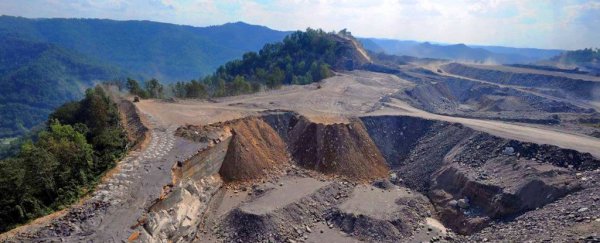In the latest investigations into Interior Department actions, the agency's inspector general has found that officials had little basis for halting a major study of health risks faced by people living near sites where mountaintops are blasted off to extract coal.
Department officials ended the previously approved study "because they did not believe it would produce any new information and felt costs would exceed the benefits," Mary L. Kendall, Interior's deputy inspector general, wrote to Rep. Raúl M. Grijalva (D-Ariz).
Yet "other than a general document entitled 'Secretary of the Interior's Priorities,' Departmental officials were unable to provide specific criteria used for their determination whether to allow or cease certain grants and cooperative agreements," she noted.
Grijalva, the ranking Democrat on the House Natural Resources Committee, requested the investigation and released Kendall's letter late Tuesday.
By the time the $1 million study, commissioned under the Obama administration, was halted, half the money had been spent by the National Academies of Science, Engineering and Medicine, which was leading the work, the probe found.
"We determined that $455,110, the amount billed, was wasted because no final product was produced," Kendall wrote. The remaining amount expired and will eventually return to the US Treasury, the report said.
Mountaintop removal can send debris filled with chemicals, including toxins, raining down on homes and waterways.
The study stood to reveal possible adverse health effects on residents in the Appalachian Mountains at a time when President Trump and Interior Secretary Ryan Zinke were pushing to revive the coal industry by extracting more of the fossil fuel. Trump recently ordered Energy Secretary Rick Perry to find ways to stop coal-fired and nuclear power plants from closing.
Officials blamed the decision to halt the study, commissioned by the Office of Surface Mining Reclamation and Enforcement, on Interior's bleak funding outlook. At the time, Trump was proposing to cut $1.6 billion from Interior's fiscal 2018 budget, a plan Congress later rejected.
"This administration does whatever it wants and lies to the public about it, and their attitude is that the public will just have to deal with it," Grijalva said in a statement.
According to the report, the inspector general's office is now conducting an audit of the hundreds of thousands of dollars spent on the study.
That office has undertaken an unusually high number of investigations into Interior decisions since Zinke took charge in March last year. Those have included reviews of the secretary's travel on private and military airplanes, the reassignment of senior career executives to far-flung areas and the behavior of National Park Service acting director P. Daniel Smith, who allegedly made a gesture involving his genitalia in an office hallway.
A second major NASEM study, which sought to find ways to make offshore oil drilling platforms in the Gulf of Mexico safer, was suspended by Interior's Bureau of Safety and Environmental Enforcement in December. The inspector general's office also looked at that action.
Officials, it said, blamed "transparency and communications issues" between officials at its headquarters and regional staff.
At the time, bureau spokesman Gregory Julian said, "Simply put, we paused the study because it appeared to be duplicative of ongoing work."
Bureau officials told investigators that the academies, which have already spent nearly $80,000 of the study's half-million-dollar funding, could resume work in September.
But that's not what the directive late last year specified: "The stop-work order, dated December 7, says that within 90 days [it] will either be lifted and work on the study can resume, or the contract to perform the study will be terminated."
The inspector general's report said the bureau has no plans to cancel the offshore drilling study, although "ultimately it still could."
A scheduled meeting between NASEM and bureau officials in July could lead to a restart in September, investigators were told.
The academies "indicated that significant changes to the scope of the work might require restarting its process, necessitating approval by the board of directors and identifying new committee members."
2018 © The Washington Post
This article was originally published by The Washington Post.
